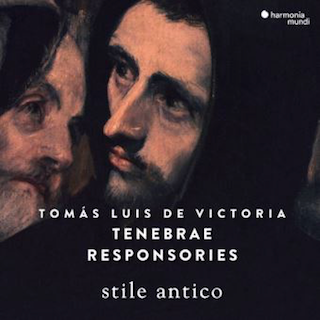The varied programming is the disc’s greatest strength, with the inclusion of a six-voice motet and excerpts from the Lamentations showing a mindfulness to provide listeners with textural and harmonic contrast. However, this is a competitive market, with a critically acclaimed recording from Tenebrae under Nigel Short, not to mention a warm and thick-textured account by The Sixteen under Harry Christophers. This new release brings plenty of imagination in the programme, but the performances of the Responsories themselves - whilst engaging and persuasive - may struggle to add anything over their competitors.
The Responsories are all about darkness; in the 16th-century in which Victoria was writing, the service would have concluded in total darkness, as the candles representing Christ, the Disciples and the three Marys were gradually extinguished during the service (‘Tenebrae’ is the Latin for darkness). Stile Antico convey the bleakness of the text well, using men’s voices alone in ‘Tenebrae factae sunt’ and ‘Aestimatus sum’; the darker hue of the bass singers is particularly striking here, conveying the pain and despair of the text. Indeed, it is a tradition that, in performance, a selection of the Responsories for upper voices are instead performed by the lower ones; whilst enabling a more vivid portrayal of the text, it also allows for contrast with the SATB scoring of the other Responsories.
Contrast is vital in the Responsories, as a danger of Victoria’s setting is monotony; all eighteen Responsories use the same mode, and similar three or four-part textures. Thus, the reversion to male-only voices for two of the Responsories creates an edifying contrast that makes it more comfortable to listen to the full disc in one sitting. Further contrast is created by the admirable inclusion of Victoria’s six-voice motet ‘O Domine Jesu Christe’ at the end of the disc, in which the more adventurous harmonies provide an interesting snapshot into the broader musical language of this Renaissance master. Equally interesting is how the disc intersperses excerpts from the Lamentations readings, sung to a plainchant setting; given that the broader Liturgy in which the Responsories appear would have been dominated by plainchant, such works provide a useful context for Victoria’s polyphonic Responsories. Such variety creates an imaginative and elegant programme that is perfectly enjoyable in a single sitting.
Contrast within the Responsories themselves is, however, slightly lacking. A mezzo forte dominates the Responsories, with the portrayal of the “innocent lamb” in ‘Eram quasi agnus innocens’ finding much the same dynamic as the presentation of the “hanged man” in ‘Amicus Meus’. Surely greater nuance could be found between these two starkly opposed images, connotations and emotions? Although one mood pervades all eighteen Responsories, the text includes some striking oppositions, contrasting good with evil, and peace with violence. Such varied images - even if united by a common emotion - deserve more nuanced treatment.
Within individual Responsories, too, there lacks dynamic subtlety; although ‘Una hora’ opens with a delicate hush courtesy of a solo voice, as soon as the choir enters, one yearns for greater dynamic nuance. Such gradations are only more important given how the text sustains a single mood.
Having said this, Stile Antico perform with great clarity of diction and purity of line. Take, for instance, the immediate solo opening of ‘Una hora’; the plaintive simplicity of the solo line contrasts with the distracting vibrato of the soloist in Schola Antiqua’s 2005 recording. However, this section also provides a useful example of how, like the disc more broadly, this new release offers a pleasant reading but nothing that adds a great deal to its numerous rivals; Ensemble Corund feature a striking crescendo on the opening note of ‘Una hora’, something that maintains the purity of the line but also imbues it with greater dramatism and weight. Both Tenebrae and Stile Antico opt for stillness instead, which communicates melancholy but arguably at the expense of drama.
Stile Antico’s acoustic allows for greater clarity and delineation of lines in ‘Animam meam dilectam’, in comparison to Tenebrae. Such a keen sense of interweaving voices is vital given that the Responsories form part of a much longer liturgy, the majority of which would have been performed to plainchant; as such, Victoria’s polyphony would have provided noticeable contrast within the broader liturgy, a fact that Stile Antico are keen to emphasise through their own clarity of line and texture.
The programming of this release is its greatest strength, with the inclusion of excerpts from the Lamentations readings as well as the concluding motet providing both engaging contrast and useful context for the Responsories as part of a longer liturgy. The performances are dark and powerful, with the use of lower voices alone for selected Responsories a striking way of illustrating the darker texts. However, the relative dynamic uniformity of the Responsories reduces the dramatic power of the text. Overall, these are engaging performances, but with strong competition from Tenebrae in particular, they are a pleasant alternative, if not a game-changer.
Jack Pepper
Recordings:
Nigel Short, Tenebrae, 2013, Signum Classics
Harry Christophers, The Sixteen, 2011, Coro
Juan Carlos Asensio, Schola Antiqua, 2005, Glossa
Stephen Smith, Ensemble Corund, 2006, Dorian Recordings
